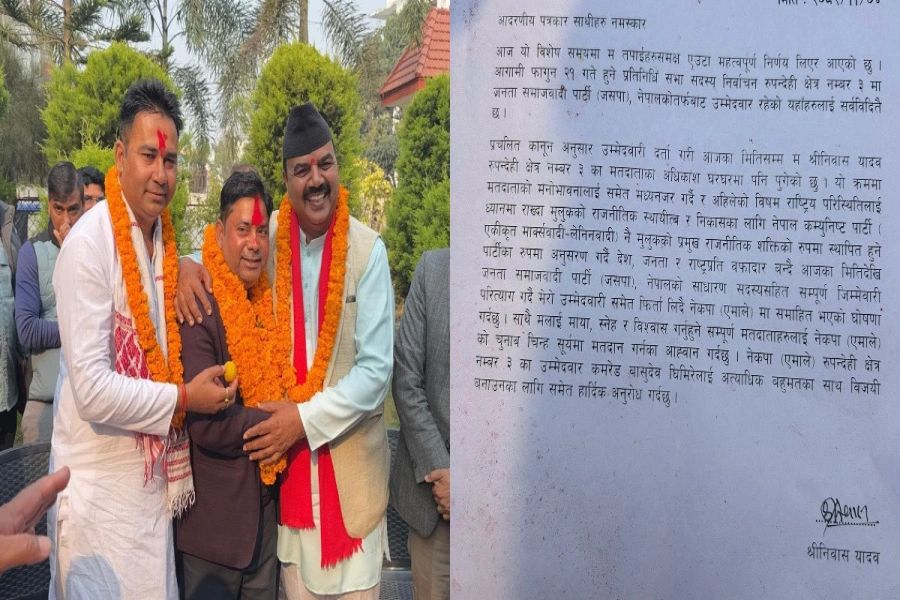KATHMANDU, June 25:The effects of the United Kingdom's referendum vote to leave the European Union are yet to be felt in Nepal, apart from a jump in the price of gold in the local market. The yellow metal rose Rs 3,000 per tola on Friday soon after the Brexit poll results came out.
Nepal Rastra Bank (NRB) is yet to work out the new exchange rates with the US dollar, pound sterling and the Euro although the pound and Euro have fallen sharply in the international market while the dollar has appreciated. Investors moving into safer investments is the reason behind this turbulence in the international currency markets, according to experts.
NRB is in a wait and see mode on currency exchange rates. Trilochan Pangeni, spokesperson of the central bank, said they will reset the exchange rates only after India responds as Nepal's currency is pegged to the Indian rupee.
Experts believe Friday's developments are merely a response to the big event, but they also indicated that there may be a medium-term impact on Nepal's economy, mainly on trade, tourism and foreign aid.
Kerala Tourism’s first STREET project inaugurated in Maravanthu...

"The market will soon stabilize from the investors' rush into safe investments like gold and currencies like the US dollar and Japanese Yen," said Swarnim Wagle, a senior economist and former member of the National Planning Commission. Wagle insists that this immediate reaction will fade away shortly as it may take at least two years for the UK's formal exit from the EU as per the Treaty of Lisbon.
"In case the market does not stabilize, possible effects are likely in Nepal in areas like trade, tourism, foreign aid and Nepali emmigration to Britain," added Wagle.
"Nepal will not be exposed to any magnified impact given the pegging of its currency to the Indian rupee but there are other possible impacts," said economist Posh Raj Pandey. Pandey is president of South Asia Watch on Trade, Economics and Environment (SAWTEE), a consortium of South Asian NGOs.
Nepal is sure to see higher import bills. "A stronger dollar will increase the import bill and also drive up inflation," said Wagle.
"Nepal will turn to more trade with India as Indian goods will be cheaper," added Pandey. This will be contrary to the approach Nepal took to diversify its trade after the Indian blockade. Nepal does about two thirds of its trade with India.
Pandey also fears possible instability in the global economy after the UK leaves the EU and this will affect Nepal mainly in the three sectors of trade, tourism and foreign aid.
Nepal will need more cash to repay its international debt and it won't be in a position to earn more foreign currency from exports as its export is negligible. In each Rs 100 in trade, Nepal's imports are worth Rs 91 and exports only Rs 9. Consumers will have to pay more for imported goods, particularly imports from third countries. Pandey said British tourist arrivals will decline.
However, Wagle disagrees with Pandey, saying that with the devaluation of their currency Britons will choose Nepal as a cheaper destination. About 35,000 British tourists visit Nepal annually.
Nepal's trade with Britain is very low and Brexit won't have any direct impact, but there might be an opportunity to increase the export capacity, said Wagle.
After leaving the EU, Britain will have its own policy on Nepal as distinct from the current EU policy. This can be beneficial for Nepal as it enjoys long-standing bilateral relations with Britain. "Britain will have a tighter immigration policy for semi-skilled Nepalis and the preference will be for skilled ones," added Wagle.
Bibek Paudel, an expert on regional issues, does not see any possible effect of Brexit on SAARC. "The regional integration of European countries will not inspire or trigger any south Asian integration as the regional dimensions in SAARC differ from those in the EU," he added.
Political leaders in Nepal said Britain's choice was quite unexpected. Former finance minister Ram Sharan Mahat tweeted, "Brexit decision with narrow margin amid polarized vote likely to result significant eco/pol ramifications!" He has not elaborated on the ramifications on Nepal and could not be contacted.




































